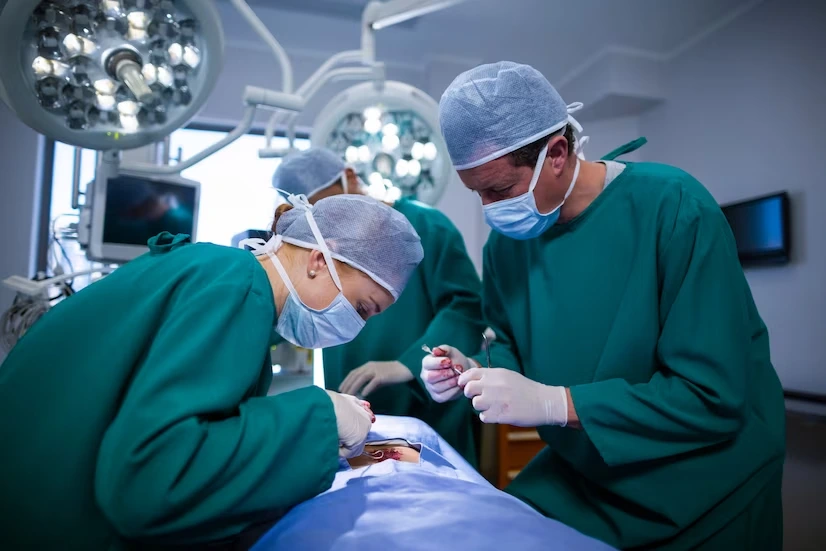Hernias are discomforting displacements of the body parts from their original position. Usually, hernias protrude outwardly and are visible on the abdominal surface. These are called external hernias.
At times, the internal body parts, especially the abdominal contents like the colon or small intestine, protrude through the openings or weak spots in the peritoneum or mesentery. This results in the occurrence of internal hernias.
Internal hernias are not visible on the outside and get identified only when it gets complicated most of the time.
Table of Contents
ToggleWhat is an Internal Hernia?
An internal hernia is the protrusion of the abdominal viscera, especially the large and small intestines, into the weak spots of the peritoneum or mesentery.
The peritoneum and mesentery of the abdominal cavity are membranes that line the abdominal cavity and cover the abdominal organs. When the peritoneum or mesentery has openings or weak spots, there arises a possibility for the small or large intestine segments to enter into them.
Internal hernias remain inside the abdominal cavity and are not visible on the abdominal surface.
Also, internal hernias are rare, accounting for less than 1% of hernia incidence.
Types of Internal Henria
Internal hernias are of different types based on the location of the hernia, namely:
- Paraduodenal hernia
- Foramen of Winslow hernia
- Transmesenteric hernia
- Transomental hernia
- Intersigmoid Hernia
- Pericecal Hernia
- Retroanastomotic Hernia and
- Supravesical hernia
All these hernias occur due to defects in the abdominal cavity’s peritoneum, omentum, or mesentery.
Causes of Internal Hernia
The chief cause for internal hernias is weak abdominal tissues that are congenital. When the abdominal tissues do not develop, or the intestines do not rotate properly during fetal development, it can lead to internal hernia later in life.
Other causes of internal hernia include:
- Abdominal trauma
- Inflammation of the abdominal tissues or intestines
- Abdominal surgeries
- Pregnancy
- Chromic coughs
- Straining while defecating
- Abdominal fluid buildup
- Heavy lifting, etc.
Symptoms of Internal Hernia
Internal hernias are rare, mild, and asymptomatic most of the time. A complicated hernia, however, gives rise to many symptoms like:
- Abdominal discomfort or pain
- Vomiting
- Nausea
- Constipation
- Abdominal tenderness
Complications of Internal Hernia
Internal hernias can get obstructed, strangulated, or incarcerated with time if left untreated. A complicated hernia is dangerous and can turn fatal with the blood supply getting cut off.
Since internal hernias include complications of the abdominal organs, it can lead to indigestion, constipation, vomiting, and weakness of the body.
Treatment for Internal Hernia
Mild and asymptomatic internal hernias are manageable without surgery. You have to take lots of liquids and give enough rest to your bowels by limiting food intake to manage a mild internal hernia.
Discomforting and complicated internal hernias require immediate surgical intervention. Also after surgery you have maitain your food habits.
Internal hernias are difficult to diagnose. So, imaging tests like computed tomography (CT scan), X-ray, etc. are widely used.
Surgical options include laparoscopy and open surgery. The choice of surgery depends upon the nature, severity, and urgency of the hernia to be repaired.
How to Prevent Internal Hernia?
Congenital internal hernias cannot be helped. But, to prevent internal hernias in later life, you can:
- Take a protein-rich diet
- Do cardiovascular exercises
- Avoid smoking and alcoholism
- Maintain a proper BMI (Body Mass Index)
- Avoid straining while defecating
- Take medication for chronic cough
- Avoid lifting heavy weights
Conclusion
Internal hernias are uncommon but demand our undiluted attention as they can get complicated within a short period.
Internal hernias are also difficult to diagnose. So, consult an experienced and qualified hernia surgeon to diagnose your internal hernia symptoms.
Advanced surgical procedures are available to treat internal hernias nowadays. So, contact a hernia surgeon as soon as possible to prevent hernia complications.
To know more about internal hernias, contact a hernia specialist.
Dr. K. Amilthan MBBS., MS., FMAS., FALS.
Heal Your Hernia Now:
- 15+ Years of Experience
- 3,000+ Surgeries
Your Journey to Wellness Begins with us.
FAQ's
Internal hernias cannot be completely cured without surgery. So, internal hernias do require surgery. Surgeries also prevent the internal hernia from getting complicated.
Internal hernias are fixed through laparoscopic or open surgeries. The surgeon places the herniated organ in its original place and sutures or uses mesh to seal the weak spot.
You can live with an internal hernia as long as the hernia does not get complicated. Take more liquids and give enough rest to your bowels to manage an internal hernia.

Dr. Amilthan
Dr. Amilthan is a renowned laparoscopic hernia surgeon based in Chennai, with over 15+ years of experience in general surgery. He completed his MBBS and MS in General Surgery at Kilpauk Medical College and Government Royapettah Hospital in Chennai.
- All Posts
- Hernia Blog

Which Doctor should you consult for Hernia? You can Consult a general surgeon or a hernia specialist for evaluation and...

A hernia occurs when an organ or any other part of your body pushes through the muscle and surrounding tissue...

An inguinal hernia occurs when the organs push through and bulge against the weak muscles of the abdomen. An effective...

